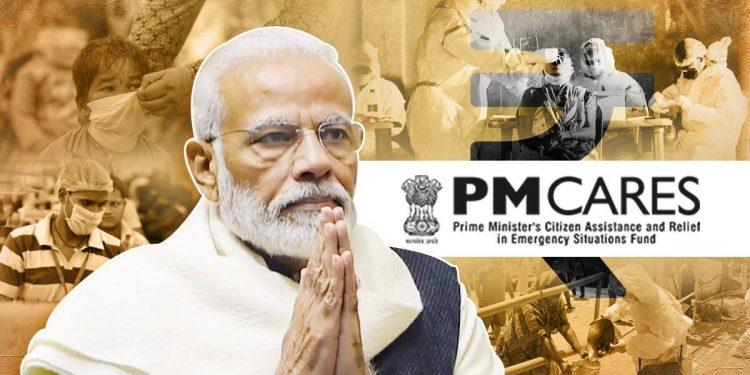PM CARES Fund: Why We Should Lift the Veil, to Demand Accountability

Photo Courtesy: The Indian Express.
Confusion surrounds the constitution of PM CARES Fund, and its operation, with contradictory statements emanating from the Centre on the nature of its functioning. Unless the veil is lifted to make it transparent, we will not be successful in ensuring its accountability, writes AMRITA NAIR.
———-
“While transparency reduces corruption, good governance goes beyond transparency in achieving openness. Openness means involving the stakeholders in decision-making process. Transparency is the right to information while openness is the right to participation”- Prime Minister Narendra Modi.
For an unassuming person, these words would inspire confidence in the current dispensation, especially in Prime Minister (PM) Modi. Although the Relief Fund set up by him is called PM CARES, the pandemic has brought to fore the multiple issues related to his governance and its lack of preparedness for the COVID-19 outbreak.
Following the COVID-19 outbreak, on March 27, 2020, the Prime Minister’s Citizen Assistance and Relief in Emergency Situations Fund (PM CARES Fund) was set up to curb the virus’ outbreak in India, and to alleviate suffering of the people due to the pandemic. In addition to guaranteeing relief from COVID-19, the fund was also expected to cover for any such disastrous episode faced by India in the future.
However, such a public welfare fund has been largely privatized in its undertakings with respect to its establishment and function. This now sparks the question of how transparent it is and for what purpose such a welfare scheme has to be silent on its operation.
A public authority?
At the outset, it must be clarified that the controversy surrounding the fund stems from how it was presented to the public. It was unmistakably sold as a public fund much like the Prime Minister’s National Relief Fund (PMNRF), while questions of its true nature remained under wraps. However the legal position, which as it presently stands, is not clear as to whether the PM CARES fund falls within the ambit of the Right to Information (RTI) Act, 2005 or the oversight of the Comptroller and Auditor General of India (CAG).
It has been the Union Government’s position that independent auditors will audit the fund. When the question of the fund being a public authority under the ambit of Section 2(h) of the RTI Act, 2005 was raised in the Lok Sabha by a Member of Parliament, the Union Ministry of Corporate Affairs had maintained that it is not a ‘public authority’ under section 2(h).
However, section 2(h) defines ‘public authority’ as “an order by the Government to establish the body/institution and that the government must own and control the body”. Following this, an RTI application was filed by activist Vikrant Tongad, seeking information regarding the fund. This was refused by the Chief Public Information Officer, PM Office (PMO) citing the Supreme Court’s observation that “indiscriminate and impractical demands under RTI Act for disclosure of all and sundry information would be counterproductive” while multiple others who filed similar queries have not received any response within the statutory period of 30 days.
Also read: ‘PM CARES Fund’ is not a public authority under RTI, says PMO
It is pertinent to note that the PM CARES fund started out with the union claiming that it was a private fund all the while working under the national emblem with government infrastructure at its disposal and overwhelming call for support to donate to it from members of the union government. Eventually, after gaining much reproval concerning the lack of transparency, the Indian government later changed course and declared that the PM CARES fund is, in fact, a body, owned, controlled and established by the union government. However, the government refused to disclose any information regarding it under the RTI Act on the ground that it receives private funds.
A body established by the government
The PM CARES fund was set up as a national charitable trust on March 28, 2020, through a press note. In addition to this, it also appointed the union Finance minister, Defence Minister and Minister of Home Affairs as ex-officio trustees, with the PM himself to be the chairman. A glance at the constitution of the fund and the persons behind it would confirm that this fund is to be managed by one of the highest government functionaries or at least has been set up with their involvement.
The Supreme Court in 2013, in the case of Thalappalam ser. Coop. Bank ltd. vs. State of Kerala ruled that the word “control” in Section 2(h)(d) of the RTI Act refers to substantial control over the management and affairs of the body by the government. This threshold is satisfied in the case of the PM Cares Fund because senior government officials occupy important posts within the structure of the fund. Similarly, in Indian Railway Welfare Organisation (IRWO) vs. D.M. Gautam & Anr. (2010), where the IRWO’s board consisted of ex-officio officials from the Ministry of Railways, the Delhi High Court held that the existence of government officials made the body a government body. Considering that the PM of India is the ex-officio chairman of a national fund dedicated to the country’s welfare while his ministers are its trustees, PM CARES would squarely fall within the holding of the high court.
Even for argument’s sake, if one were to consider that the PM CARES fund was not a public authority, the PMO is still a Public Authority and therefore stands as a body with an obligation to disclose the information sought. This is because subject to certain restrictions, the activities of the Office of the PM ought to be of public concern and where the said office is involved in the running of the fund, its activities with regard to the same would be amenable to the RTI Act. This is clarified in the Sections 2(f) and (j) of the Act, which defines information with public authorities as anything which exists, in any form with a public authority. The public can access such information through inspection, obtaining certified copies, electronically or through notes.
The Central Information Commission (CIC) has already ruled on the nature of a similar fund, the PM National Relief Fund. In Shri Shailesh Gandhi vs. PMO (2008), it held that the body was not a ‘public authority’ under the RTI Act. The decision to set up a new fund when there already exists the PM’s National Relief Fund (PMNRF), which is nearly identical, and other statutorily defined funds such as the State Disaster Response Fund (SDRF) and the National Disaster Response Fund (NDRF), has been widely questioned. In such a situation, the decision of the CIC is unlikely to be different in the event of the PM Cares Fund, considering the similarity to PMNRF.
The PMNRF was set up in January 1948 to accept public contributions for the assistance of Partition refugees. Subsequently, it was used to provide immediate relief to the families of those killed in natural calamities, the victims of major accidents and riots, and support medical expenses for acid attack victims, among other things. This fund, as of December 2019, had an unspent balance of Rs. 3,800 crores in its corpus, which could have been utilised for providing the necessary funds for medical infrastructure and COVID-19 relief operations. Both the funds are like one another in the following ways:
A) Both the funds have been created in the name of the PM and operated by the PM as the Ex Officio Trustee and Chairman of the fund.
B) The funds were not established/created by any statute and hence lack the statutory backing.
C) The claim of both these funds is that they are public charitable trusts.
D) The objective of both the funds is to provide relief to those affected by natural calamity or disaster or a public health emergency.
E) Both funds are operated by the PM out of the PMO.
F) All contributions made to the two funds are exempted from taxation under Section 80G of the Income-tax Act, 1961.
G) Both funds receive tax exemption under Section 10 of the Income-tax Act.
H) Contributions made to both the funds are considered as CSR Activity under item (viii) of Schedule 7 of the Companies Act, 2013.
When one looks at these similarities and follows the decision in Shailesh Gandhi, one would think that the PM CARES Fund, just like the PMNRF, must not be a public authority falling within the scope of the RTI Act. Hence, any appeal one makes to the CIC would be a futile exercise.
However, the fact remains that the Supreme Court, in its judgments in S.P. Gupta vs. President of India (1981) and Reliance Petrochemicals Ltd. vs. Indian Express Newspapers, Bombay Pvt. Ltd & Ors. (1988), upheld the right to information as a fundamental right under Articles 19 and 21 of the Indian Constitution. Furthermore, the RTI Act was passed with the objective of facilitating an informed citizenry and transparency of information, which are vital to the functioning of the State. It is a tool for holding the governments and their instrumentalities accountable to the governed. Thus, any denial of information with regard to the fund to the citizens of India would be an infringement of their fundamental right to information, subverting the very concept of democracy.
“State” under Article 12
Referring to the discussion above regarding the structure of the fund and the constitution of the fund, there is an argument of the fund being “State” under Article 12 of the Constitution, and thus amenable to writ remedy before the High Courts and the Supreme Court.
There are various tests to determine whether a body is a State or not; chief among them are whether the government enjoys deep and pervasive control over the functioning of the entity, and whether the entity is performing a public function. The fact that the fund is made up of various key members of the union government and that the very intention behind setting up the fund was to deal with a health crisis by providing medical aid and infrastructure, which fall within the ambit of the goal of the government to facilitate public welfare, indicates that the fund fits within ‘State’.
Additionally, the Union Ministry of Corporate Affairs issued a clarification stating that contributions to the PM CARES Fund will qualify as funds set up by the union government as a CSR expenditure. The fund also sought income tax exemption that was made possible through the Taxation and Other Laws (Relaxation and Amendment of Certain Provisions) Act, 2020. In addition to tax exemption, the fund also obtained a Permanent Account Number card. The fund also carries a gov.in domain, which the National Informatics Centre completely controls.
Thus, even if the legal status of the PM CARES fund does not allow the RTI Act’s interference, it would still warrant the interference of courts through this recognition of the fund as State under Article 12.
Even if the courts do not accept the “State” argument, the history of Constitutional law is full of instances where rights of citizens were safeguarded by the High Courts by Article 226 of the Constitution, which is wider than the powers of the Supreme Court, in terms of the wide catena of rights that can be agitated by citizens.
Thus, it is clear that transparency is a standard that all governments must be held to, and that through projects like PM CARES, the government is attempting to obfuscate this ideal and bring about a culture of opaque governance. In such a situation, there are remedies that can be pursued to ensure that transparency as a principle is not merely something to wax eloquent on but rather affirmed through practice.
Disclaimer: This article is based on the Writ Petition filed by Samyak Gangwal in the Delhi High Court, in which he is being represented by Senior Advocate Shyam Divan along with Advocates Debopriyo Moulik, Krishnesh Bapat and Ayush Shrivastava.
(Amrita S. Nair is the Founder of The Silent Sexism Project and the Intersectional Feminist Magazine. She is an advocate at the Bombay High Court. The views expressed are personal.)
Get the latest reports & analysis with people's perspective on Protests, movements & deep analytical videos, discussions of the current affairs in your Telegram app. Subscribe to NewsClick's Telegram channel & get Real-Time updates on stories, as they get published on our website.
























